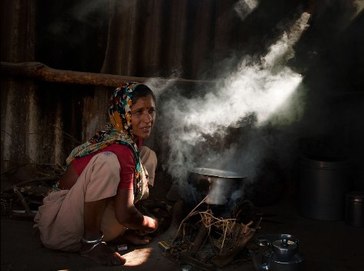Scaling the clean cookstoves industry
A nascent global industry promises to save and improve millions of lives and reduce environmental degradation.
Gary Hattem, president of the Deutsche Bank Americas Foundation, spoke at a Council on Foreign Relations meeting on March 24 along with Radha Muthiah, the executive director of the Global Alliance for Clean Cookstoves, and Jonathan Cedar, CEO of BioLite, an innovative producer of clean cookstoves based in Brooklyn.
A majority of low-income families in developing countries, over 3 billion people, use cooking fuels such as charcoal and firewood on an open fire, often within small homes. The resulting indoor air pollution is responsible for an estimated half a million deaths in Africa alone every year, 90% of which are children below the age of four. Burning these fuels contributes to deforestation and carbon pollution. Additionally, women and children waste significant labor and face severe personal risks as they search for firewood, especially near refugee camps and in conflict zones.
More efficient cookstoves and cleaner fuel offer a better alternative. A nascent global industry is forming to deliver these solutions, but market penetration has been limited by products falling short of customer expectations.
The Brooklyn-based start-up BioLite has responded by developing an innovative design technology. Its cookstove achieves the goal of reducing carbon and smoke emissions and fuel costs from everyday heating and cooking. It also does something no other stove on the market does, which is produce electricity. And for consumers without access to an electrical grid, a cookstove that can charge a cell phone is especially valuable. BioLite’s ingenuity extends to its business model, which connects two disparate markets. Its camp stoves, which retail for around $130, are targeted at affluent consumers in developed markets for recreational camping. BioLite is now investing that profit to develop cookstoves using the same core technology for developing markets, where they can save lives and improve quality of life as well.
Together with the Global Alliance for Clean Cookstoves, Deutsche Bank’s Global Social Investment Group is establishing the $4 million Clean Cooking Working Capital Fund to finance early-stage ventures like BioLite with capital that is affordable and patient.
The fund will provide financing to enterprises that face difficulty accessing traditional sources of capital, with the goal of accelerating development of the clean cooking supply chain in low-income communities. Support to BioLite from this fund will finance its expansion into emerging markets by 2015.
As presider Isobel Coleman, senior fellow for U.S. foreign policy at the Council on Foreign Relations, noted after the meeting, “The benefits of clean cookstoves are so large one could argue that they should just be given away. But not only is this approach financially unsustainable, it never allows a viable market – with lucrative sales and crucial after-service – to develop.”
Mr. Hattem added, “As a lender, we can tie our loans to some very clear covenants on not just financial performance but social performance as well.”

